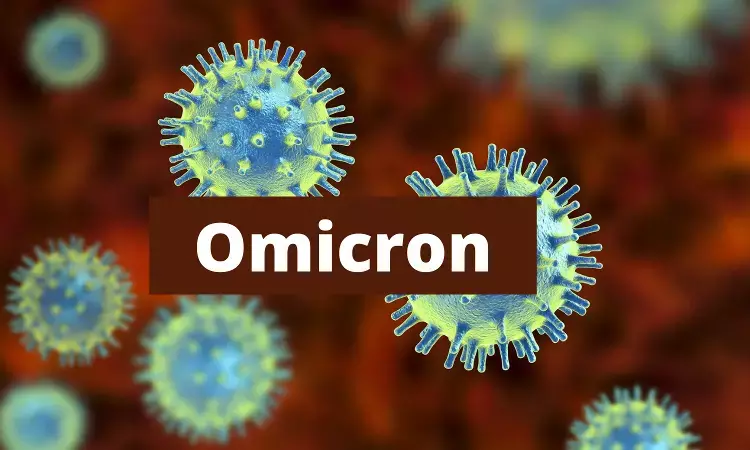- Home
- Medical news & Guidelines
- Anesthesiology
- Cardiology and CTVS
- Critical Care
- Dentistry
- Dermatology
- Diabetes and Endocrinology
- ENT
- Gastroenterology
- Medicine
- Nephrology
- Neurology
- Obstretics-Gynaecology
- Oncology
- Ophthalmology
- Orthopaedics
- Pediatrics-Neonatology
- Psychiatry
- Pulmonology
- Radiology
- Surgery
- Urology
- Laboratory Medicine
- Diet
- Nursing
- Paramedical
- Physiotherapy
- Health news
- Fact Check
- Bone Health Fact Check
- Brain Health Fact Check
- Cancer Related Fact Check
- Child Care Fact Check
- Dental and oral health fact check
- Diabetes and metabolic health fact check
- Diet and Nutrition Fact Check
- Eye and ENT Care Fact Check
- Fitness fact check
- Gut health fact check
- Heart health fact check
- Kidney health fact check
- Medical education fact check
- Men's health fact check
- Respiratory fact check
- Skin and hair care fact check
- Vaccine and Immunization fact check
- Women's health fact check
- AYUSH
- State News
- Andaman and Nicobar Islands
- Andhra Pradesh
- Arunachal Pradesh
- Assam
- Bihar
- Chandigarh
- Chattisgarh
- Dadra and Nagar Haveli
- Daman and Diu
- Delhi
- Goa
- Gujarat
- Haryana
- Himachal Pradesh
- Jammu & Kashmir
- Jharkhand
- Karnataka
- Kerala
- Ladakh
- Lakshadweep
- Madhya Pradesh
- Maharashtra
- Manipur
- Meghalaya
- Mizoram
- Nagaland
- Odisha
- Puducherry
- Punjab
- Rajasthan
- Sikkim
- Tamil Nadu
- Telangana
- Tripura
- Uttar Pradesh
- Uttrakhand
- West Bengal
- Medical Education
- Industry
Is mRNA vaccine effective against Omicron variant of COVID-19? Study sheds light

USA: Amid the recent scare of the B.1.1.529 (omicron), the new COVID-19 variant, there is a need to assess the effectiveness of the current COVID-19 vaccines against Omicron. Considering this a team of researchers from South Africa (where the omicron variant was first identified), aimed to investigate the effectiveness of the BNT162b2 mRNA vaccine (Pfizer–BioNTech) against the omicron variant in preventing hospitalization for Covid-19. The study was published in the New England Journal of Medicine as a research letter on December 29, 2021.
For this purpose, the researchers estimated the vaccine effectiveness of two doses of the BNT162b2 vaccine (i.e., full vaccination) against hospitalization for Covid-19 caused by the omicron variant using data from Discovery Health, a South African managed care organization.
They compared the vaccine effectiveness against Covid-19 hospitalization associated with the omicron variant among fully vaccinated members, during the period from November 15 to December 7 in South Africa. In which, the researchers dubbed a proxy for dominance of the omicron variant (omicron proxy period), against estimates of vaccine effectiveness between September 1 and October 30, when the delta variant was dominant (comparator period).
In total, the researchers analyzed a total of 133,437 PCR test results that had been obtained during the comparator period, of which 28.6% were obtained at least 14 days after the patient had received the second dose of vaccine. They analyzed 78,173 PCR test results for the proxy omicron period, out of which 32,325 (41.4%) had been obtained at least 14 days after the second dose.
Key findings include:
- The overall test positivity was 6.4% during the comparator period and 24.4% during the proxy omicron period, whereas the Covid-19 admission rate was 10.8% and 2.2%, respectively, as a percentage of positive PCR test results.
- Patients with positive cases were younger during the proxy omicron period than during the comparator period.
- During the proxy omicron period, a vaccine effectiveness of 70% (95% confidence interval was found, a finding that was supported by the results of all sensitivity tests. This measure of vaccine effectiveness was significantly different from that during the comparator period, when the rate was 93% against hospitalization for Covid-19.
To conclude, during the proxy omicron period, the effectiveness of the Pfizer–BioNTech vaccine (albeit at a reduced level) was maintained against hospital admission for Covid-19 that was presumed to have been caused by the omicron variant versus the rate associated with the delta variant earlier in the year. This reduction in vaccine effectiveness may be mitigated by the addition of a booster dose of vaccine, the authors suggest.
Reference:
The study titled, "Effectiveness of BNT162b2 Vaccine against Omicron Variant in South Africa," is published in the New England Journal of Medicine.
DOI: 10.1056/NEJMc2119270
Dr Kamal Kant Kohli-MBBS, DTCD- a chest specialist with more than 30 years of practice and a flair for writing clinical articles, Dr Kamal Kant Kohli joined Medical Dialogues as a Chief Editor of Medical News. Besides writing articles, as an editor, he proofreads and verifies all the medical content published on Medical Dialogues including those coming from journals, studies,medical conferences,guidelines etc. Email: drkohli@medicaldialogues.in. Contact no. 011-43720751


